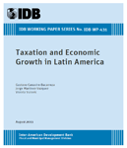Taxation and Economic Growth in Latin America
Date
Aug 2013
Tax policy is among the most common and relevant instruments in the toolkit of policy-makers when thinking about promoting growth, yet there is not compelling evidence regarding its effect in Latin American countries. Using a variety of approaches, we estimate the effects on growth of the most important taxes for the region, namely personal income tax, corporate income tax, general taxes on goods and services, including value added and other sales taxes, and revenues from natural resource. We evaluate the effect of these tax instruments on growth for Argentina, Brazil, Mexico, and Chile using vector autoregressive techniques, and for close to the entire region and a worldwide sample of developing and developed countries using panel data estimation. We find that, for the most part, personal income tax does not have the expected negative effect on economic growth in Latin America, which is largely explained by the small collections in the region. For corporate income tax, our results suggest reducing tax evasion and greater reliance on collection may boost economic growth in the region as a whole and especially for natural resource exporting countries. But, we also find small negative effects of corporate income tax on growth for individual countries, specifically Argentina, Mexico, and Chile. Finally, our results suggest that greater reliance on consumption taxes has significant positive effects on growth in Latin American in general, although we again find slight negative effects in some of the selected countries. On the other hand, natural resource revenues do not seem to contribute to growth.




